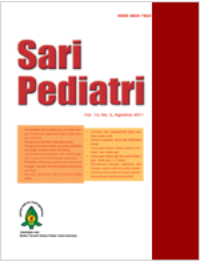Faktor-Faktor yang Berhubungan dengan Kemampuan Sosialisasi Anak
Sari
Latar belakang.Kemampuan sosialisasi berkontribusi besar bagi kesiapan anak bersekolah dan keberhasilan akademik. Banyak faktor yang berhubungan dengan kemampuan sosialisasi anak antara lain pendidikan ibu, pekerjaan ibu, status ekonomi dan pola asuh.
Tujuan. Mengetahui hubungan pendidikan ibu, pekerjaan ibu, status ekonomi, pola asuh dengan kemampuan sosialisasi anak.
Metode. Penelitian menggunakan metode cross sectional. Subjek penelitian adalah anak-anak yang mengikuti PAUD Kecamatan Seberang Ulu I Palembang tahun 2013 yang memenuhi kriteria inklusi. Dilakukan analisis untuk mengidentifikasi hubunganpendidikan ibu, pekerjaan ibu, status ekonomi, pola asuh terhadap kemampuan sosialisasi anak. Pola asuh dinilai menggunakan parenting style questionaire (PSQ), sedangkan kemampuan sosialisasi anak dengan interaction rating scale (IRS).
Hasil. Empatpuluh anak diikutkan dalam penelitian. Pola asuh non otoritatif merupakan satu-satunya faktor yang ditemukan secara bermakna berhubungan dengan kurangnya kemampuan sosialisasi anak setelah analisis multivariat (p=0,001; OR 52,80).
Kesimpulan. Pola asuh non otoritatif berhubungan dengan kekurangan kemampuan sosialisasi anak.
Kata Kunci
Teks Lengkap:
PDFReferensi
Dirjen PAUD non formal dan informal. Petunjuk teknis penyelengaraan pos PAUD. Kemendiknas: Jakarta; 2011.
Henningham HB, Boo FL. Early childhood stimulation interventions in developing countries: a comprehensive literature review. IZA Discussion Paper No. 5282. Bonn: Forshunginstitut zur Zukunft der Arbeit (IZA);2010.
Zaiv Y. Social information processing patterns, social skills and school readiness in pre school children.J Exp Child Psychol.2013;114:306-20.
Arnold DH, Kupersmidt JB, Voegier-Lee ME, Marshall N. The Association between Preschool Children’s Social Functioning and Their Emergent Academic Skills. Early Child Res Q 2012;27:376-86.
Smart D, Sanson A. The role of temperament and behavior. Fammatter 2001;59:10-5.
Gerungan WA. Psikologi sosial. Edisi ketiga. Bandung: Refika Aditama;2010.h.92.
Anme T, Shinohara R, Sugiyama Y, Tong L, Tanaka E, Watanabe T, dkk. Interaction rating scale (IRS) as an evidence based practical index of children’s social skill and parenting. J Epidemiolog 2010;20(suppl2):S419–26.
Shaffer DR, Kipp K. Developmental Psychology childhood and adolescence. Edisi ke-8. Boston. Wadsworth Cengage Learning;2010.
Setiadi EM, Kolip U. Pengantar sosiologi pemahaman fakta dan gejala permasalahan sosial: teori, aplikasi dan pemecahannya. Jakarta: Kencana;2011.
Pushpalata, Dhanda B, Singh CK. Family: a predictor a social competence of preschoolers. Stud Home Commsci 2009;3:63–6.
Onder A, Gulay H. Reliability and validity of parenting style & dimension questionnaire. Procedia Soc Behav Sci 2009;1:508-14.
Pemerintah RI. Peraturan Pemerintah RI No. 32 tahun 2013 tentang perubahan atas Peraturan Pemerintah No. 19 Tahun 2005 tentang Standar Nasional Pendidikan: Jakarta; 2013.
Badan Pusat Statistik. Perkembangan upah minimum kota. BPS: Palembang;2013
Carneiro P, Meghir C, Parey M. Maternal education, home environment and the development of children and Adolescents. IZA Discussion Paper No. 3072. Germany;2007.
Gershoff ET, Raver CC, Aber JL, Lennon MC. Income is not enough: incorporating hardship into models of income associations with parenting and child development. Child Dev 2007;78:70–95.
Abedini Y. Zamani BE, Kheradmand A. Rajabizadeh G. Impacts of mothers; occupation status and parenting styles on levels of self control, addiction to computer games, and educational progress of adolescents. Addict Health 2012;4:102-10.
Mensah, Kuranchie MK, Alfred. Influence of parenting styles on the social development of children. AJIS 2013;2:123-9
Kol S. The effects of parenting styles on social skills of children aged 5-6. MOJES 2016;4:49-58.
Lavasani MG, Borhanzadeh S, Afzali L. Hejazi E. The relationship between perceived parenting styles, social support with psychological well-being. Procedia Soc Behav Sci 2011;15:1852-6.
Andriyana C. Hubungan pola asuh dan usia orang tua terhadap kemampuan sosialisasi anak usia 3-5 tahun di Paud Riyadhul Huda Bentarsari Kecamatan Salem Kabupaten Brebes Jawa Tengah (Skripsi). Purwokerto: Program Sarjana Keperawatan Universitas Muhammadiyah Purwokerto, 2012.
Xu C. Direct and indirect effects of parenting style with child temperrament, parent-child relationship and family functioning on child social competence in the Chinese cultur: testing the latent models (disertasi). Denton: Doctoral Program in Education of University of North Texas,2007.
Altay FB, Gure A. Relationship among the parenting styles and the social competence and prosocial behaviors of the children who are attending to state and private preschool. Edu Sci Theory and Practice 2012;12:2712-8.
De Souza JF, Paul P. Perceived paternal parenting style and social competence. J Indian Acad Appl Psychol 2013;39:103-9.
Santrock JW. Perkembangan anak. Edisi ke-11 jilid 2. Jakarta: Erlangga;2007.h.167.
Latouf NCDS. Parenting styles affecting the behaviors of five years old (tesis). Pretoria: Master of Diaconology of University of South Africa,2008.
Huitt WG, Dawson C. Social development. Why it is important and how to impact it. Educational psychology interactive, Valdosta GA: Valdosta state university. April 2011. Diunduh 7 desember 2013. Didapat dari: http://www.edpsyinteractive.org/papers/socdev.pdf
Chowdhury S, Mitra M. Parenting Style and altruistic behavior of adolescents’ life. J Res Hum Soc Sci 2015;3:20-4.
Malekpour M. Low birth weight infants and the importance of early intervention: enhancing mother-infant interactions a literature review. B. J Dev Disabil 2004;50:78–88.
Crnic KA, Gaze C, Hoffman C. Cumulative parenting stress across the preschool period: relations to maternal parenting and child behavior at age 5. Infant. Child Dev 2005;14:117–32.
Miller MJ. Authoritarian parenting. The center or christian counseling and relationship development LLC.2010. Diunduh 7 Desember 2013. Didapat dari: http://cccrd.publishpath.com/Websites/cccrd/images/Authoritarian.pdf.
Drozdz E. Pokorski M. Parental attitudes and social competence in adolescents. J Physiol Pharmacol 2007;58:175–84.
Carlo G, Mestre MV, Samer P, Tur A, Armenta BE. The longitudinal relations among dimensions of parenting styles, sympathy, prosocial moral reasoning and prosocial behaviors. Int J Behav Dev 2010;35:116-24.
DOI: http://dx.doi.org/10.14238/sp18.5.2017.373-8
Refbacks
- Saat ini tidak ada refbacks.
##submission.copyrightStatement##
##submission.license.cc.by-nc-sa4.footer##
Email: editorial [at] saripediatri.org


Sari Pediatri diterbitkan oleh Badan Penerbit Ikatan Dokter Anak Indonesia
Ciptaan disebarluaskan di bawah Lisensi Creative Commons Atribusi-NonKomersial-BerbagiSerupa 4.0 Internasional.




